Lots of people love surprises. Coming home to find that your partner has made your favorite meal for dinner or seeing a bouquet of flowers waiting for you on your desk in the office can feel like a magical moment.
But not all surprises are welcomed. One woman recently shared a story on Reddit detailing how she managed to secretly move out of the home she shared with her ex while he was away at work. Below, you’ll find the full story, as well as a conversation with Dr. Ruth Ann Harpur.
This woman and her ex agreed on a date when she would move out of their home

Image credits: Prostock-studio (not the actual photo)
But instead of waiting around for that day to come, she decided to surprise him by moving out early


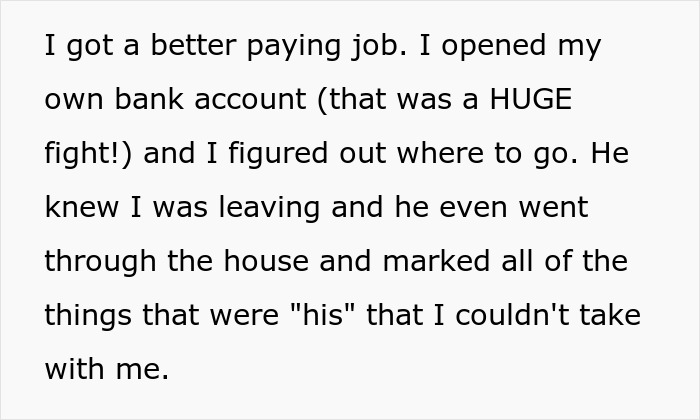



Image credits: demopicture (not the actual photo)

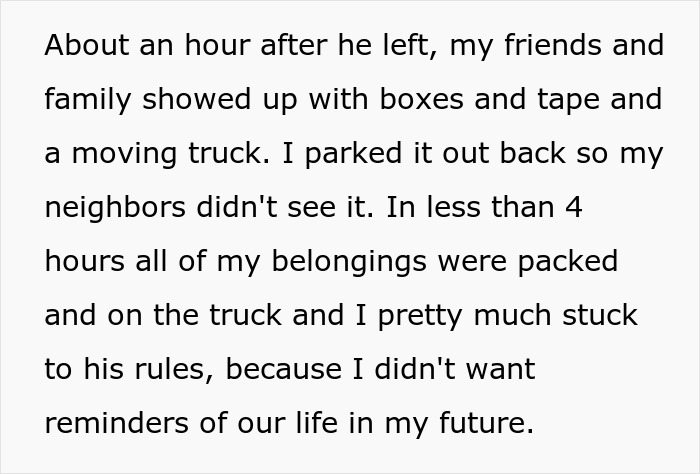






Image credits: Grigsbyjawn
“Careful safety planning is essential when leaving a controlling relationship”
Every relationship has its ups and downs. No matter how much you love your partner, there will be days when you have to resist the urge to blow up at them for tracking dirt over freshly mopped floors or forgetting that you have plans to see your mother on Saturday (even though you reminded them 15 times).
No one is perfect, but in a healthy relationship, both partners can communicate and work through their issues, rather than escalate them. Unfortunately, however, not everyone is able to have a cool, calm and collected conversation with their significant other.
To learn more about unhealthy relationships and how to get out of them, we reached out to Dr. Ruth Ann Harpur. She was kind enough to have a chat with Bored Panda and discuss why it’s so difficult to escape a toxic relationship.
“Leaving any relationship is difficult because we form strong emotional bonds with those closest to us. In toxic relationships, it can be even harder because they systematically erode self-esteem and self-confidence, making it easy to doubt your ability to manage on your own,” the expert shared. “Financial control and ab**e can also make it extremely difficult to secure alternative accommodation or resources.”
“More importantly, research consistently shows that coercive control – including financial control, isolation, and surveillance – is one of the strongest predictors of escalating violence, including [taking someone’s life],” Dr. Harpur continued. “Studies of domestic h******es in the UK have found that extreme control, rather than physical violence alone, is often a precursor to m****r. This is why careful safety planning is essential when leaving a controlling relationship, as the risk of violence often increases at the point of separation.”
“Leaving a controlling partner is not simple or risk-free”
So is it a good idea to move out while a toxic partner is not home?
“In some cases, leaving while a controlling or ab****e partner is away can be the safest option,” Dr. Harpur says. “However, the key factor is safety. If the partner has a history of violence or volatility or controlling behavior, planning an exit carefully is crucial.”
The expert strongly recommends consulting organizations that specialize in DV support and, if necessary, the police to develop a plan. “This might involve securing emergency accommodation, leaving the area, alerting trusted friends or family, and ensuring financial stability,” she noted.
“While the Reddit story is framed humorously, leaving a controlling partner is not simple or risk-free,” the relationship expert pointed out. “It may be satisfying to imagine getting back at someone by taking the mattress or all the toilet paper, but intentionally provoking a volatile person could lead to serious consequences.”
“Research suggests that the most dangerous time in an ab****e relationship is when the victim leaves, so my advice would be to take things seriously, avoid unnecessary conflict, and get professional support to ensure the safest possible exit,” Dr. Harpur shared.
We also asked the expert what victims should know once they’ve left a toxic relationship. “There are no hard and fast rules, but I always encourage people to ask: Why am I maintaining contact? If it’s necessary due to co-parenting, joint finances, or legal matters, keeping communication minimal and transactional is best,” she told Bored Panda.
“[It] isn’t just about escape; it’s about reclaiming your autonomy, rebuilding your self-worth, and moving towards something better”
“It’s also important to be aware of post-separation ab**e, which can take many forms, including stalking, harassment, financial control, legal threats, and manipulation through children,” Dr. Harpur warns. “Some controlling ex-partners become more dangerous after the breakup, using any means available to regain power.”
“Because of this, ongoing support is crucial. I strongly encourage people to seek advice from domestic ab**e organizations such as Women’s Aid, use protective measures (such as a non-molestation order if necessary), and lean on friends, family, and professional support networks,” she continued.
Dr. Harpur says that it’s vital to focus on rebuilding self-esteem, reconnecting with supportive people, and rediscovering personal interests after leaving a relationship like this. “It’s common for people to feel nostalgic and second-guess their decision, especially if single life feels overwhelming at first,” she warns. “In those moments, remember why you left and stay grounded in reality.”
“One of the biggest pitfalls is getting stuck in the past, analyzing the relationship endlessly or seeking ‘closure’ from someone who was never capable of giving it,” the expert added. “True closure comes from moving forward—not from trying to make sense of the wreckage.”
Finally, Dr. Harpur says, “At the end of the day, the best ‘revenge’ isn’t about taking the mattress or leaving without toilet paper—it’s about building a life that feels good, on your terms, without looking back. Leaving a toxic relationship isn’t just about escape; it’s about reclaiming your autonomy, rebuilding your self-worth, and moving towards something better.”
We would love to hear your thoughts on this petty revenge in the comments below, pandas. Then, if you’re interested in checking out another Bored Panda article discussing a similar situation, look no further than right here.
Readers poured out support for the author in the comments, and she joined in on the conversation


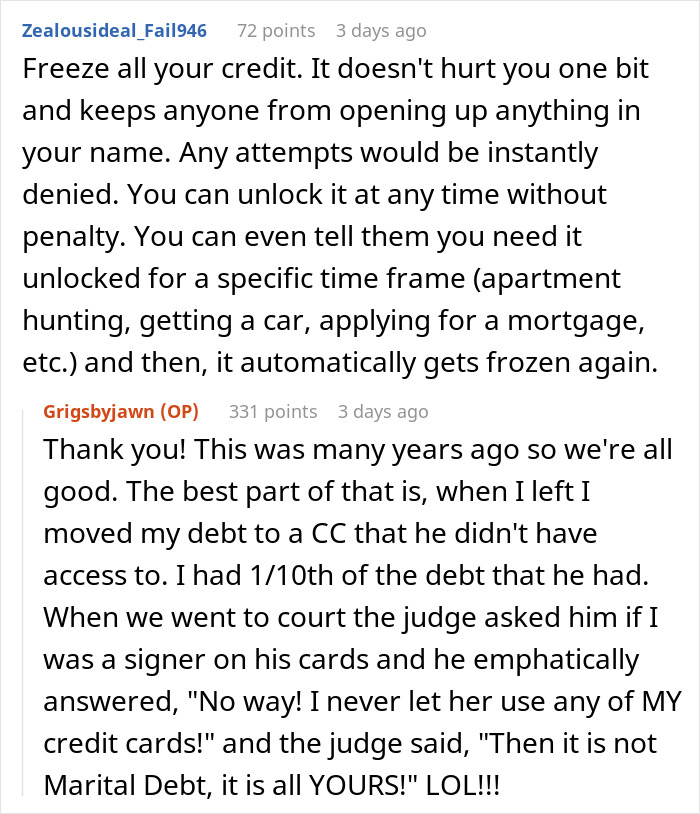
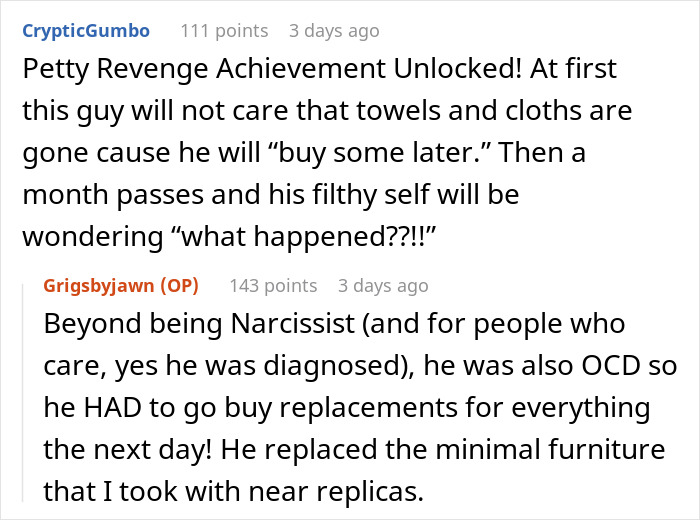

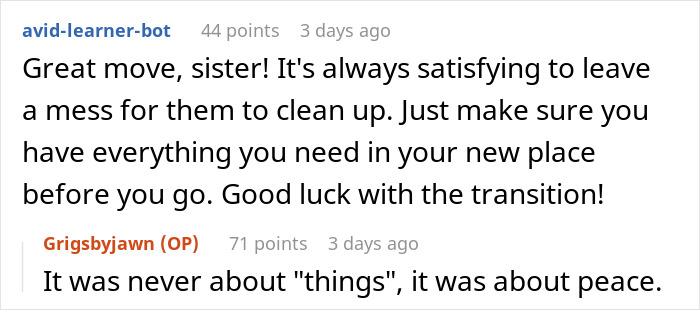

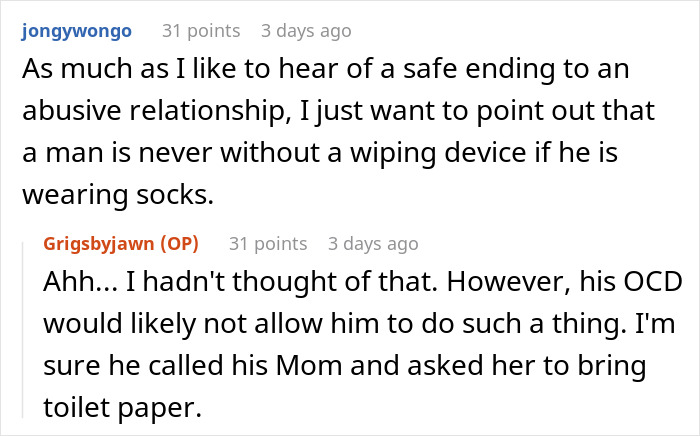
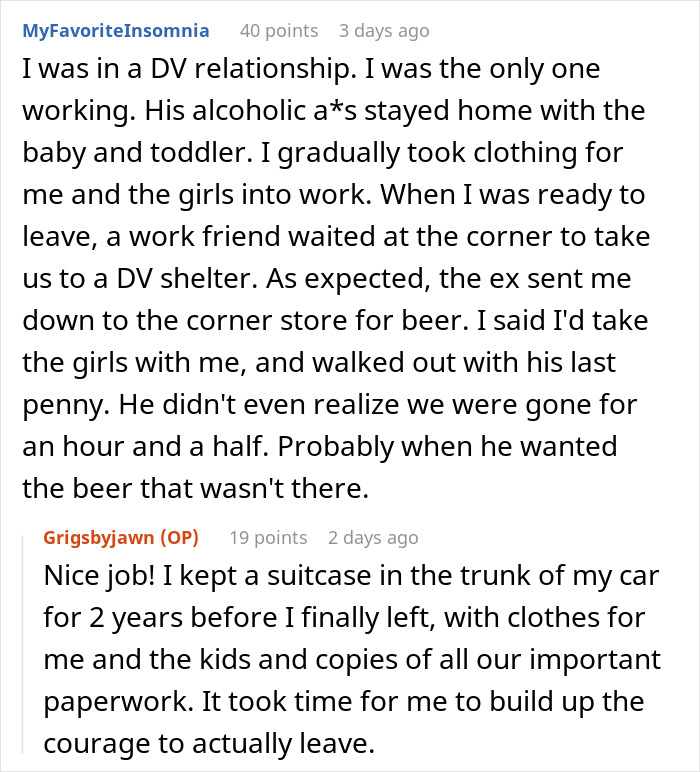
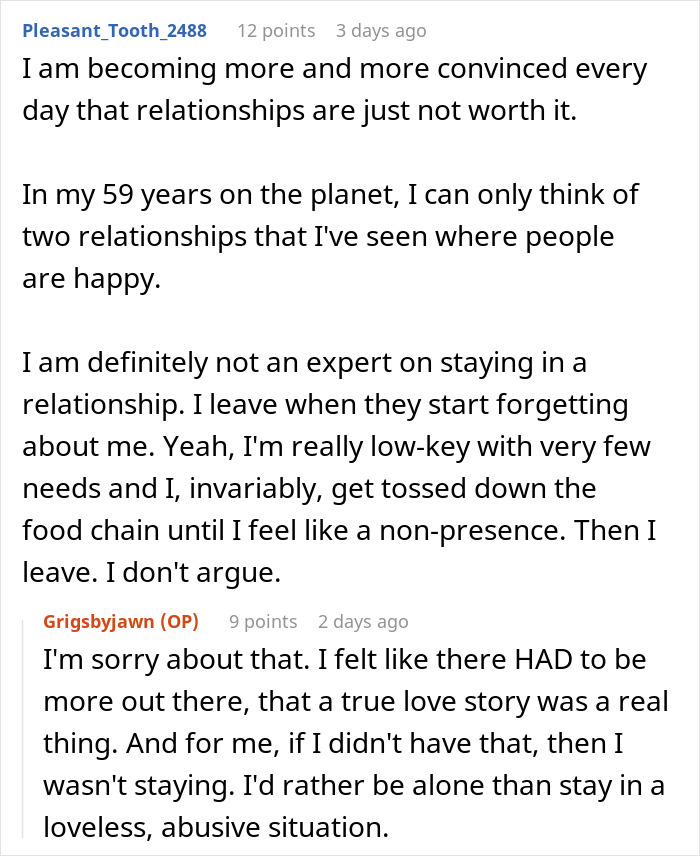

Many also applauded her for walking away from the relationship, and some shared similar stories of petty revenge
































